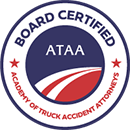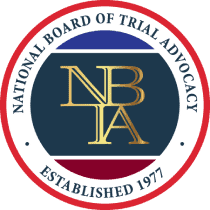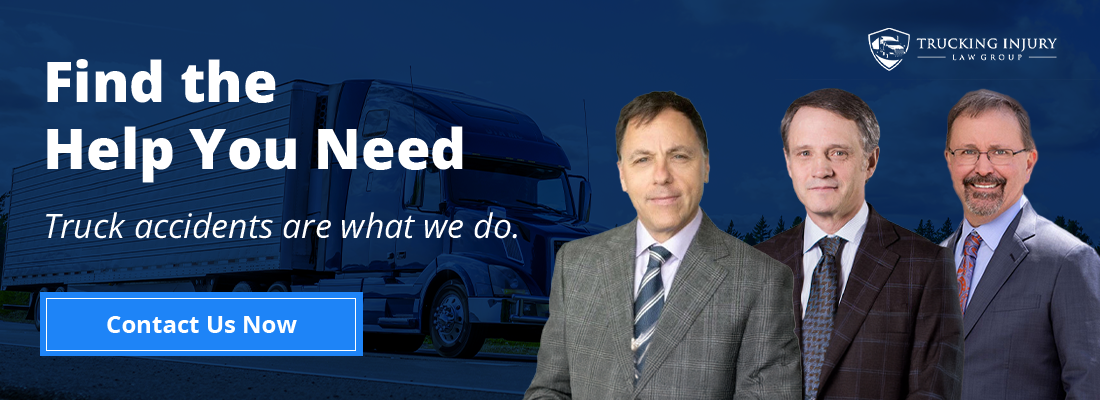Idaho Truck Accident Attorney
When you’ve been involved in a truck accident in Idaho, the aftermath can be overwhelming. From severe injuries to property damage, the consequences of these collisions can be devastating.
The Federal Motor Carrier Safety Administration reported nearly half a million truck accidents in the US in 2021, more than 100,000 of which included injuries.
If you find yourself in such a situation, seeking the assistance of an Idaho truck accident lawyer is crucial.
Below, we’ll discuss the role of a truck accident attorney, the unique challenges of truck accident cases in Idaho, and how to choose the right legal representation to advocate for your rights. Contact us if you’ve been hurt in a trucking accident and are looking to understand your rights. Your initial consultation at Trucking Injury Law Group is free of charge.
Truck Accidents in Idaho
Idaho’s highways serve as vital arteries for commercial trucking, facilitating the transportation of goods across the state and beyond. However, with this increased traffic comes an elevated risk of truck accidents as well.
These accidents can occur for various reasons, including driver fatigue, distracted driving, inadequate maintenance, and inclement weather conditions, all of which are common in Idaho. Given the size and weight differences between commercial trucks and passenger vehicles, collisions involving trucks often result in catastrophic injuries and fatalities.
Truck accidents in Idaho can result from various factors, ranging from driver errors to mechanical failures and adverse road conditions. Here are some common causes of truck accidents in the state:
- Driver Fatigue: Long hours behind the wheel can lead to driver fatigue, impairing a truck driver’s judgment, reaction time, and overall performance. Fatigue-related accidents often occur when drivers violate hours-of-service regulations or don’t take adequate breaks during their shifts.
- Distracted Driving: Distractions such as texting, talking on the phone, eating, or adjusting electronics can divert a driver’s attention from the road, increasing the risk of accidents. Even a momentary distraction can have severe consequences when operating a large commercial vehicle.
- Speeding: The National Highway Traffic Safety Administration reports that 29% of all vehicle-related deaths in 2022 involved speeding. Speeding is a significant factor in many truck accidents in Idaho, as well. Excessive speed reduces a truck driver’s ability to react to changing traffic conditions and increases the severity of collisions. Speeding can also lead to loss of control, especially on curves or in adverse weather conditions.
- Improper Loading or Overloading: Improperly loaded cargo or overloaded trucks can compromise the vehicle’s stability and handling, increasing the risk of rollover accidents or lost load incidents. Failure to secure cargo properly can also result in shifting loads, which can affect the truck’s balance and maneuverability.
- Mechanical Failures: Mechanical failures, such as brake failure, tire blowouts, or steering system malfunctions, can lead to catastrophic accidents. Poor maintenance practices or defective truck parts contribute to these failures, highlighting the importance of regular inspections and repairs.
- Driving Under the Influence: Truck drivers who operate vehicles under the influence of alcohol, prescription drugs, or illegal substances pose a serious threat to public safety. Studies, like this International journal of Environmental Research and Public Health journal article, have found that 19% of commercial truck drivers reported binge drinking (5 or more drinks in a short period), while nearly 10% of the drivers participated in everyday drinking. Impaired judgment and diminished motor skills significantly increase the likelihood of accidents.
- Inexperienced or Inadequately Trained Drivers: Trucking companies may hire inexperienced or inadequately trained drivers to meet demand, compromising safety standards. Lack of experience can lead to errors in judgment, improper vehicle operation, and an increased risk of accidents.
- Adverse Weather Conditions: Idaho’s weather can be unpredictable, with snow, ice, fog, and high winds posing challenges for truck drivers. Failure to adjust driving behavior to accommodate adverse weather conditions can lead to accidents due to reduced visibility, slippery roads, and decreased traction.
- Aggressive Driving or Road Rage: Aggressive driving behavior like tailgating, illegal lane changes, and acts of road rage can escalate quickly, leading to collisions involving trucks and other vehicles on the road.
- Roadway Defects or Hazards: Poorly maintained roads, construction zones, and unexpected hazards like potholes or road debris can contribute to truck accidents. Inadequate signage or road markings can also increase the chances of collisions, especially at night or in low-visibility conditions.
If you’ve been injured in a truck accident in Boise or anywhere in Idaho, it’s essential to seek legal representation from a skilled attorney who can protect your rights and help you pursue the compensation you deserve. Contact us to schedule that no-risk, no obligation consultation now.
How Long Do I Have to File a Truck Accident Claim?
In Idaho, the statute of limitations for filing a truck accident claim is generally two years from the date of the accident. This time limit is set by state law and serves as a deadline for initiating legal action against the parties responsible for the accident.
It’s also important to note that the statute of limitations can vary depending on the specific circumstances of the case and the type of claim being pursued. In some situations, such as accidents involving government drivers or claims of wrongful death, deadlines or notice requirements may differ.
Failing to file an accident claim within the applicable statute of limitations can result in the loss of your right to seek compensation for injuries, property damage, and other losses resulting from the accident.
That’s why it’s absolutely essential to talk with an experienced truck accident attorney as soon as possible after the accident to ensure that your legal rights are protected and that any potential claims are filed promptly.
Why Hire an Idaho Truck Accident Lawyer
A skilled attorney serves as an advocate for individuals who have been injured in truck accidents. Their primary objective is to protect the rights of their clients and pursue fair compensation for their injuries, medical expenses, lost wages, and pain and suffering.
From conducting a thorough investigation to negotiating with insurance companies and litigating in the courtroom if necessary, a knowledgeable attorney will guide you through every step of the legal process.
Investigation and Evidence Gathering
One of the critical tasks undertaken by a lawyer who represents Idaho truck accident victims is the investigation of the crash. This involves gathering evidence such as police reports, witness statements, surveillance footage, and electronic data from the truck’s onboard systems.
By meticulously analyzing this information, your attorney can reconstruct the accident scene, determine liability, and build a compelling case on your behalf.
Navigating Liability Issues
Truck accident cases often involve multiple parties that may share liability for the accident.
These parties may include:
- The truck driver
- The trucking company
- The owner of the truck or trailer
- The manufacturer of defective truck parts
- Even third-party maintenance contractors
Identifying all potentially liable parties and holding them accountable requires a thorough understanding of state and federal trucking regulations, as well as experience in handling complex litigation. You can count on an experienced truck accident attorney in Idaho have this knowledge. So, if you’re looking to speak with one, be sure to reach out to us now for your free case review.
Compliance With Federal Regulations
Trucking companies and commercial drivers are subject to stringent regulations imposed by Idaho statutes for commercial truck drivers, as well as the Federal Motor Carrier Safety Administration (FMCSA).
These regulations govern various aspects of trucking operations, including driver hours-of-service limits, vehicle maintenance requirements, and cargo securement standards.
An experienced truck accident lawyer will be well-versed in these regulations and can leverage violations of federal laws to strengthen your case.
Negotiation and Settlement
Many truck accident cases are resolved through negotiation and settlement outside of court. Your attorney will negotiate with the insurance company on your behalf, seeking a settlement that fully compensates you for your injuries and losses.
However, insurance companies often try to minimize their liability and may offer lowball settlements. Your attorney will ensure that any settlement offer adequately reflects the extent of your damages and future needs.
Litigation and Trial
In cases where a fair settlement cannot be reached, litigation may be necessary to pursue justice.
Your lawyer will be prepared to take your case to trial and present a compelling argument to a judge and jury. With their expertise in trial advocacy and litigation strategy, they’ll fight to secure the compensation you deserve and hold any negligent parties accountable for their actions.
Choosing the Right Truck Accident Lawyer
When selecting an Idaho truck accident lawyer to represent you, it’s essential to consider their experience, track record of success, and dedication to client satisfaction.
Look for an attorney who specializes in truck accident cases and has a proven ability to achieve favorable outcomes for their clients. Additionally, seek out a lawyer who prioritizes open communication, transparency, and personalized attention to your case.
If you’ve been injured in a truck accident in Idaho, don’t hesitate to seek legal representation from a qualified attorney here at Trucking Injury Law Group. With their knowledge of state and federal regulations, investigative skills, and advocacy experience, our lawyers will be your strongest allies in pursuing the compensation you deserve.
By entrusting your case to one of our experienced truck accident lawyers, you can seek justice while still being able to focus on healing and rebuilding your life.
Contact us today for a free consultation.








